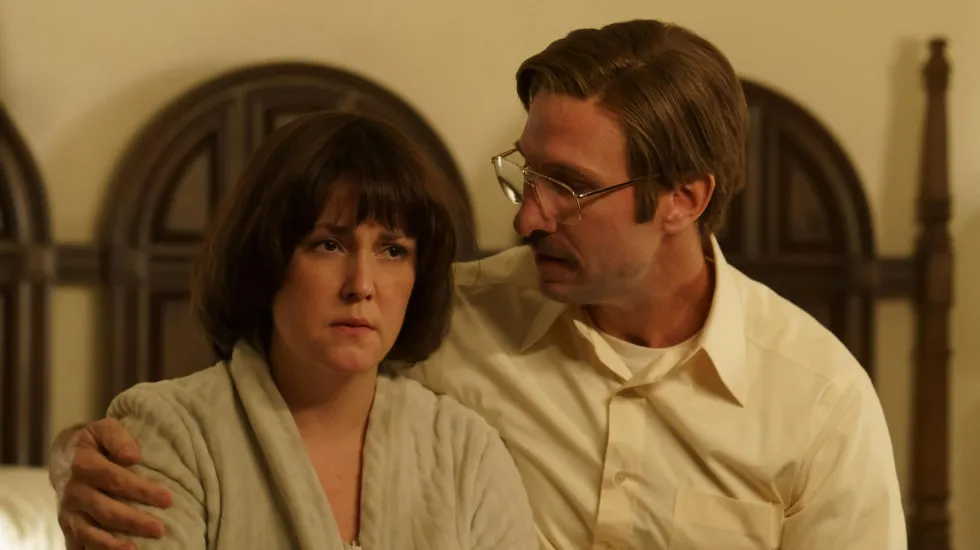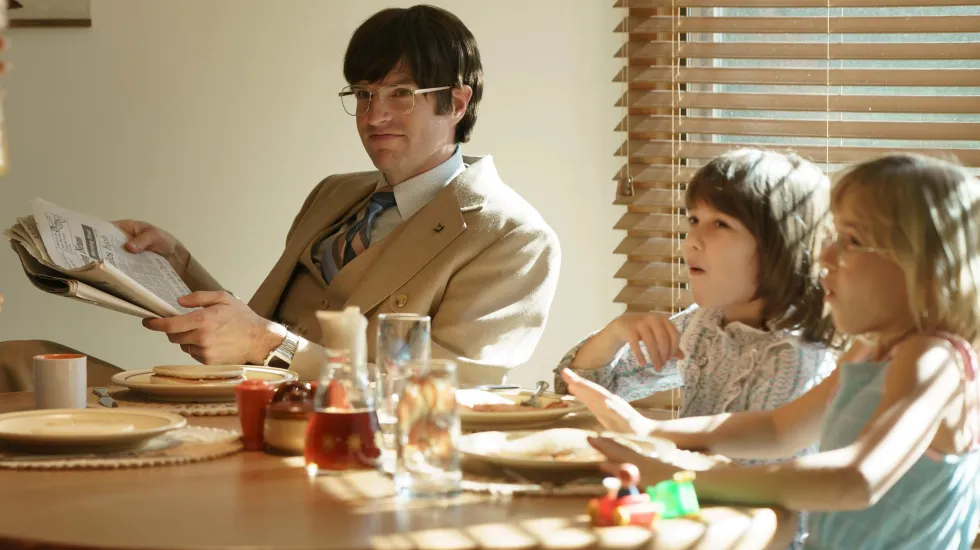
The agent/actor discussion must go something like this:
Agent: It’s a great part.
Actor: My character gets killed in the first episode!
Agent: True. But wait until you see the FLASHBACKS.
The flashbacks. That’s when these true-crime limited series bring the victims back to life, so we can see them as more than blood-covered bodies lying on the floor of their homes. We can understand how they lived, loved, laughed—and what led to someone very close to them allegedly taking their life.
A five-part series with a new episode premiering each night Monday through Friday on Hulu.
Such was the case with Daisy-Edgar Jones as a murdered mother and wife in “Under the Banner of Heaven,” and with Toni Collette as a murdered mother and wife in “The Staircase,” and now with Melanie Lynskey as a murdered mother and wife in the Hulu five-part series “Candy,” with the premiere episode dropping Monday. The three tremendously talented actors deliver pivotal performances in their respective series, as they bring a good measure of respect and dignity to the memories of the real-life individuals they’re playing.
“Candy” is the first of two limited series coming out in 2022 interpreting the true story of Texas housewife Candy Montgomery killing her friend and neighbor Betty Gore in 1980. Elizabeth Olsen will play Candy and Lily Rabe is Betty in David E. Kelley’s adaptation, coming later this year to HBO Max.
In the Hulu series, Jessica Biel is the beautiful and popular and upbeat Candy, who on the surface seems to have it all, while Lynskey plays the depressed, socially awkward, deeply needy and resentful Betty, who never fits in with the other housewives at church gatherings and backyard barbecues, who is overwhelmed by motherhood and who comes close to having a breakdown every time her husband Alan (Pablo Schreiber) has to leave town for a few days. It’s a beautifully nuanced performance.
Although “Candy” devotes the majority of screen time to telling events from the title character’s point of view, Lynskey gives Betty a memorable and constant presence, whether she’s a ghostly figure of conscience staring down Candy in the courtroom, or we see her in a flashback sequence in which she feels so alone and so incapable of dealing with stress that she fires up the vacuum cleaner just to drown out the crying of her newborn baby. Betty was clearly depressed and in need of help and she never got it, and through Lynskey’s performance, we find that tragic and heartbreaking.

Biel is nearly unrecognizable beneath the curls and the oversized, period-piece glasses as she turns in equally fine work as Candy, who dotes on her affable albeit perpetually distracted and borderline goofy husband Pat (Timothy Simons) and always seems to be organizing some sort of activity involving her church or her children or both. On the surface, Candy is the epitome of the happy suburban mom of the early 1980s, but she feels stifled and smothered, and she decides she’ll have an affair with … somebody. She eventually targets Alan Gore, the tightly wound husband of Betty, and no, it doesn’t bother Candy in the slightest that their kids play together, and that Candy is supposed to be a friend to Betty. She needs these afternoon trysts in a cheap motel. She needs to feel alive again.
Filmed in saturated colors to reflect the time period, with the production design perfectly capturing the wood-paneled, macrame-friendly, shag carpet look of suburban houses and offices of 1980, “Candy” features a number of memorably tense sequences, e.g., when Alan is in his hotel room on a business trip and he can’t get Betty on the phone and you can see the sense of dread enveloping his very being, as three neighbor men (two armed with guns, because Texas) check on Betty at Alan’s request and eventually find Betty’s blood-soaked body. The crime scene is so gruesome, their first reaction is Betty had been shot—but it’s soon determined someone had attacked her with an ax, leaving some 41 wounds on her.

Candy is the last person to see Betty alive and, as such, is helpful and cooperative with the police. At first, authorities believe some unhinged drifter must have broken into the house and attacked Betty, but that theory is quickly shoved aside as it becomes increasingly apparent Candy was the attacker. After some early attempts to cover up the crime and provide a weak alibi, Candy comes clean and freely admits she was the one who killed Betty, but it was self-defense.
With an ax. Forty-one times.
“Candy” becomes a courtroom procedural in the later episodes, but it remains a fascinating psychological character study throughout. We’re appalled by Candy’s actions and convinced she’s a borderline sociopath; even as all the details of her affairs and her attack on Betty are revealed during the trial, she speaks of wanting to put this all behind her so everything can go back to being normal. Timothy Simons goes beyond his usual unlikable wonk persona in his portrayal of Candy’s husband Pat, a good guy who puts up with his wife’s madness because he truly loves her—but even Pat has his breaking point. When he finally unloads on Candy and calls her out, he’s speaking for all of us.







